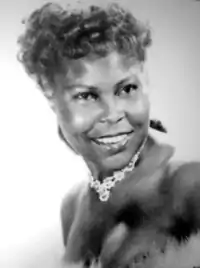Mabel Fairbanks
Mabel Fairbanks (November 14, 1915 – September 29, 2001) was an American figure skater and coach. As an African American and Native American woman she paved the way for other minorities to compete in the sport of figure skating such as Naomi Lang. She was inducted into the US Figure Skating Hall of Fame, as the first person of African American and Native American descent, and the International Women's Sports Hall of Fame.
| Mabel Fairbanks | |
|---|---|
 Mabel Fairbanks | |
| Personal information | |
| Country represented | United States |
| Born | November 14, 1915 Florida, Florida Everglades |
| Died | September 29, 2001 (aged 85) Burbank, California |
| Coach | Maribel Vinson Owen Howard Nicholson |
Early life
Mabel Fairbanks was born on November 14, 1915 in Florida's Everglades. Her father was African American while her mother was a Native American of English descent.[1][2][3] In a 1999 interview, she said, "my mother took in everybody – every kid off the street – and gave them a place to stay and something to eat. So I never knew who were my real sisters and brothers, but my older sister told me there were 14."[1]
Fairbanks was orphaned at the age of eight when her mother died.[4] After staying with a teacher who treated her like a "maid," she joined one of her brothers in New York City.[4] She worked for him and his wife at their fish market on 8th Avenue in Harlem but they became displeased when, out of sympathy, she gave a family more fish than they had paid for.[1] A wealthy woman saw her sleeping on a park bench and offered her a job as a babysitter at a home overlooking Central Park.[2]
Career
Fairbanks began figure skating around 1925 to 1928.[5] After observing children at the Central Park ice rink, she bought herself used skates, stuffed them with cotton because they were two sizes too big, and began skating at the rink.[2] She said, "Blacks didn't skate there. But it was a public place, so I just carried on."[3] She gained further inspiration after seeing Sonja Henie in the 1936 film One in a Million.[5]
In the 1930s, Fairbanks, due to her race, was denied access to the local rink by the cashier but she kept returning until the manager admitted her.[5] Maribel Vinson Owen and Howard Nicholson provided her with technical advice.[6][5] Fairbanks was not allowed to compete in the national qualifying event for the Olympics or any competition.[3] In a 1998 interview, she said, "If I had gone to the Olympics and become a star, I would not be who I am today."[4]
Fairbanks performed in shows in New York until the 1940s.[7][2] She often wore pink or purple skate boots rather than the more common black or white.[6] She practiced on a 6 ft by 6 ft rink constructed by her uncle Wally in her room.[1] After relocating to Los Angeles, she toured internationally, skating with Ice Capades in Mexico and later with Ice Follies.[3] After returning to the United States, she saw a sign with "Colored Trade Not Solicited" at the Pasadena Winter Gardens. She stated, "my uncle had newspaper articles written about it and passed them out everywhere until they finally let me in."[8]
Fairbanks coached singles and pairs, including Tiffany Chin, Billy Chapel, Scott Hamilton, Kristi Yamaguchi / Rudy Galindo, Tai Babilonia / Randy Gardner, Leslie Robinson, Michelle McCladdie, Richard Ewell, Debi Thomas, Atoy Wilson, and Jean Yuna.[4][9][10] She also taught skating to the children of many celebrities.[4] In 1997, she became the first African American inducted into the US Figure Skating Hall of Fame.[2] She was inducted into the International Women's Sports Hall of Fame in October 2001.[11][12]
Personal life
Fairbanks never married.[2] She was diagnosed with myasthenia gravis in 1997[4] and with acute leukemia in mid-2001.[2] She died on September 29, 2001 at Providence Saint Joseph Medical Center in Burbank, California.[2][3][13] She is interred in the ground at the Hollywood Forever Cemetery, Hollywood, California. Her grave is right at the beginning of the bridge to the Clark Mausoleum.
See also
References
- "An Oral History: Mabel Fairbanks" (PDF). LA84 Foundation. January 7, 1999. Archived (PDF) from the original on September 20, 2018.
- Quintanilla, Michael (October 4, 2001). "Obituaries: Mabel Fairbanks, 85; Black Ice Skater". Los Angeles Times.
- Reed, Christopher (October 8, 2001). "Obituary: Mabel Fairbanks". The Guardian.
- Levine, Bettijane (February 19, 1998). "The Ice Mother Blazed the Skating Trail for Others". Los Angeles Times.
- Scheurer, Ronald A. (December 1, 1997). "Breaking the Ice: The Mabel Fairbanks Story". American Visions. Questia Online Library.
- Gavilanes, Nancy (January 14, 2001). "FIGURE SKATING; A Pioneer at the Rink Is Proud of Her Legacy". The New York Times.
- "Mabel Fairbanks Harrassed [sic] By Jim Crow". The Afro American. May 5, 1945.
- McClean, Tony (March 6, 2010). "An Original Ice Princess: Mabel Fairbanks". Black Athlete Sports Network. Los Angeles Sentinel. Archived from the original on September 20, 2018.
- Schneider Farris, Jo Ann (September 22, 2008). "Ewell helped create African-American skating legacy". IceNetwork.com. Archived from the original on August 17, 2016.CS1 maint: unfit URL (link)
- Elfman, Lois (January 15, 2015). "Wilson looks back on barrier-breaking experience". IceNetwork.com. Archived from the original on July 1, 2018.CS1 maint: unfit URL (link)
- "Mabel Fairbanks: Breaking Down Barriers". Women's Sports Foundation. Archived from the original on June 18, 2002.CS1 maint: unfit URL (link)
- "International Women's Sports Hall of Fame". Women's Sports Foundation. Archived from the original on November 27, 2014. Retrieved January 18, 2015.
- Andres, Holly (October 5, 2001). "MEMORIALS PENDING FOR ICE SKATING LEGEND". Daily News (Los Angeles, CA). The Free Library.